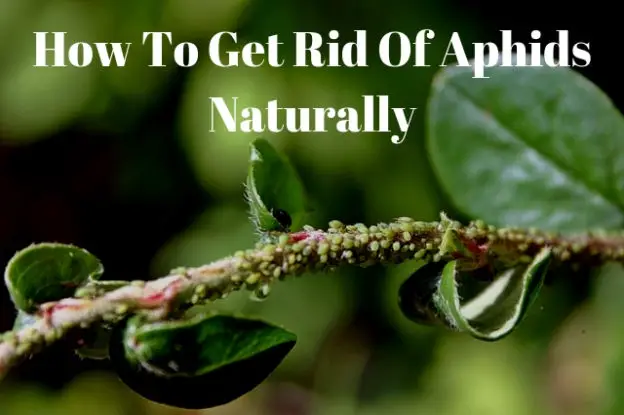Every gardener will have come into contact with aphids at one time or another, and we all have tips and tricks to deal with them. This post is how to get rid of aphids naturally and as the title suggests, that means organically, without chemicals. I will touch on chemical methods later on in the post, but let’s start with the natural ways first.
Table of Contents
Method #1: fingers
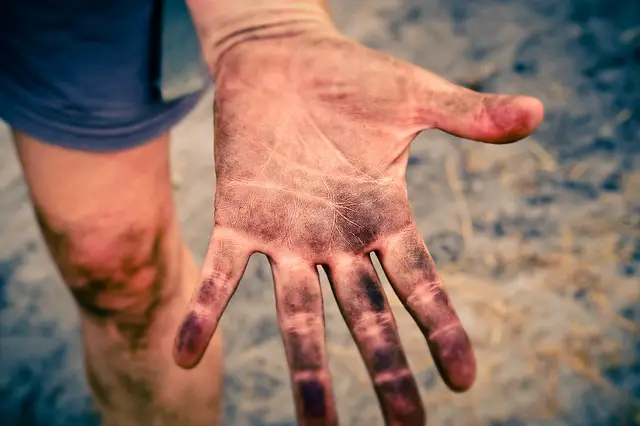
At the first sign of aphid infestation, you need to take action and if the infestation is mild this method will work. Just gently rub your thumb and forefinger against the aphids and squash them into the plant’s stem or leaf. This might seem a bit gruesome but it is effective and they wash off your fingers quite easily.
The problem with this method is unless you catch the aphids early enough, you won’t be successful in eliminating them all. Now aphids can multiply at an amazingly fast rate and have even been known to clone themselves to keep their species going. So if you don’t get them all, the next day when you go to inspect your plants there will be more of the pests.
Squashing them with your fingers is an effective way of killing aphids but it can be quite messy. Your fingers will get covered and you will need a cloth to wipe off dead aphids to make room for the next lot.
This leads to the second method on how to get rid of aphids naturally. Some of you will probably ignore the first method and go straight to this one as there is no physical contact with the insects involved.
Method #2 spray with high pressure water
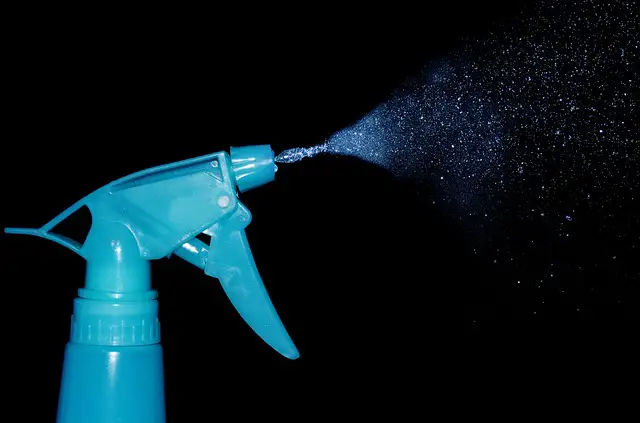
If there is a large infestation of aphids on your plants and you want to get rid of them naturally, try a strong spray or jet of water. Fill a spray bottle with cold water and set at it’s finest spray (strongest jet) and watch the aphids get washed away. If your plants are of a more robust type, you can use a hose with a spray to do this.
With more delicate plants using the spray bottle which is gentler is advisable, as this will not harm the delicate structure of the plants. As aphids are soft bodied, this can be quite an effective way of killing aphids but sometimes there are just too many and a stronger solution must be found.
Which leads us onto the next method on how to get rid of aphids naturally which uses a natural poison.
Method #3 spray with rhubarb
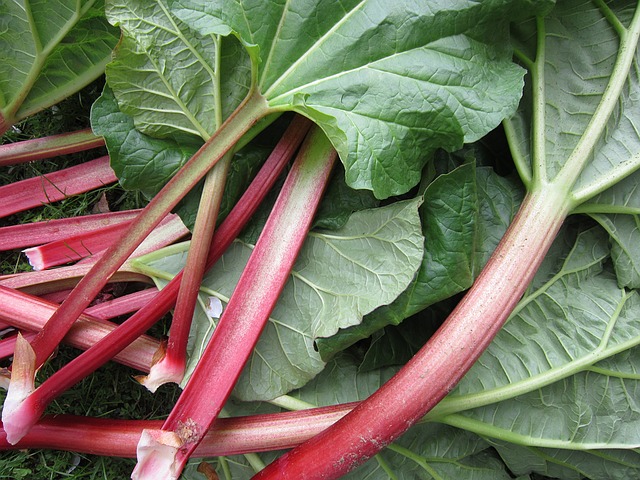
To make a aphid killing, natural, poisonous spray take about 8 to 10 rhubarb leaves, cut them small enough to fit in a saucepan and boil in water for 20 – 30 minutes. What you are doing here is extracting the oxalic acid from the rhubarb leaves. Be careful though as this poison will harm you as well as the aphids if you swallow any.
Once the liquid is cool, strain into a spray bottle and attack the aphids. Cover each one in the spray and watch them die. The cooled, boiled leaves can be added to the compost heap and is perfectly safe left to rot down.
As soon as the spray touches the aphids it will kill them, thus getting rid of aphids naturally. Only spray on calm days so that the spray can be controlled. Remember to dispose of any left over spray immediately to eliminate the risk of poisoning anyone. Also this spray is most effective when used fresh.
If you use this spray on edibles always wash them well before eating as oxalic acid is extremely harmful to humans. According to the Philippine Council For Health Research and Development,
Less than a teaspoon of this substance can kill a adult and it will only take a pinch of it to kill a child.
Philippine Council For Health Research and Development
So although this is a sure fire way of killing aphids, it is also quite dangerous to humans and other wildlife. Use extreme caution if you decide to make and use a rhubarb spray.
Method #4 Nettle Spray
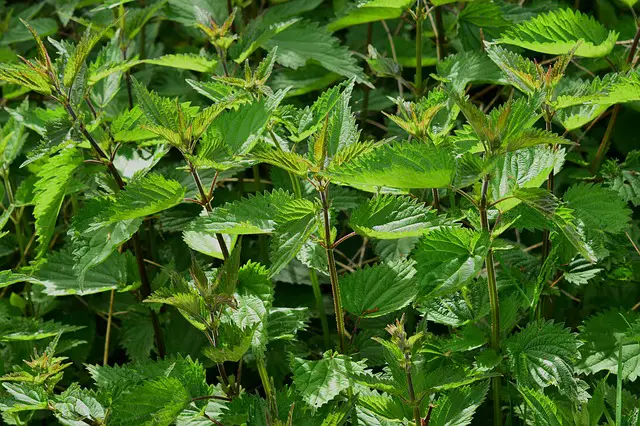
A similar idea to the rhubarb spray but cannot be used as a cure, more a prevention. So to deter aphids from getting on your plants, carefully cut fresh nettles into small pieces. Place in a bucket, fill the bucket to the top with water.
Leave to steep for 7 days then strain solution into a spray bottle and cover the whole plant from stalk to tip. Aphids can’t stand nettles so this spray disguises your plants and the aphids will look elsewhere for food. The leaves can be added to the compost heap.
Take care when harvesting nettle leaves and wear gloves as they will sting if they come in contact with the skin. This method is safer than the rhubarb spray as it is not poisonous, but will not get rid of an aphid infestation. It will only work as a deterrent.
Method #5 Neem Oil
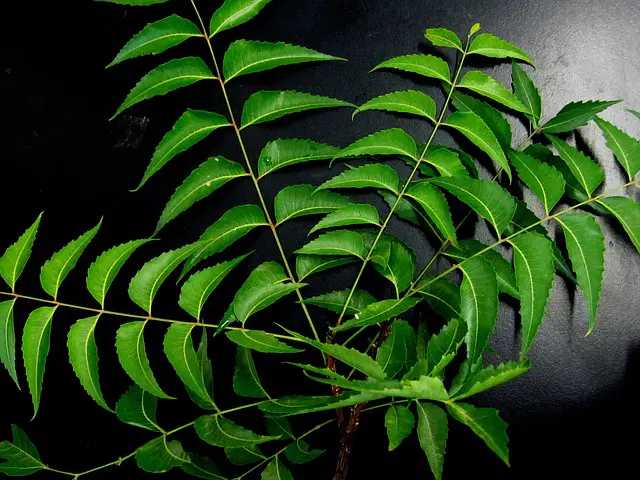
Neem oil originates in India and is extracted from trees related to the mahogany family. The naturally occurring chemicals in neem oil interfere with aphid feeding ability and also messes with their reproductive cycle. Making it harder for the females to lay eggs and thus diminishing aphid numbers.
Neem oil should be diluted in water at a rate of 2 tablespoons per gallon of water, and added to a spray bottle then sprayed directly onto the aphids.Many gardeners prefer neem oil as it is organic. Whilst that is true it is also indiscriminate, it will get rid of aphids naturally, but it will also get rid of beneficial insects as well.
The whole plant should be covered in neem oil spray and if necessary this should be repeated after 7 days.
Method #6 Vinegar Spray
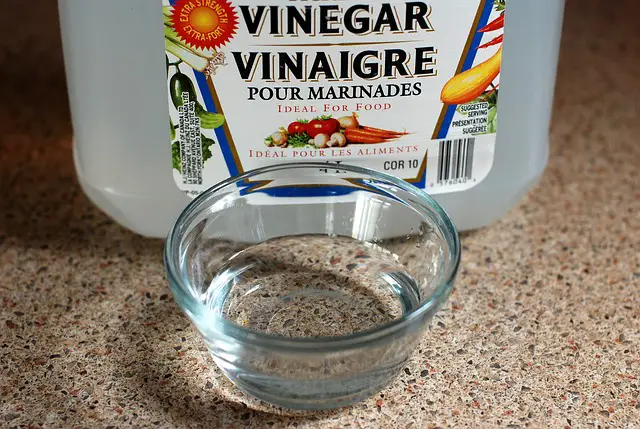
Fill a spray bottle one third full with white vinegar, top up with water, agitate and spray directly onto aphids. This will kill on contact but will need to be re applied until the aphids are all gone.
Method #7 Essential Oils Spray
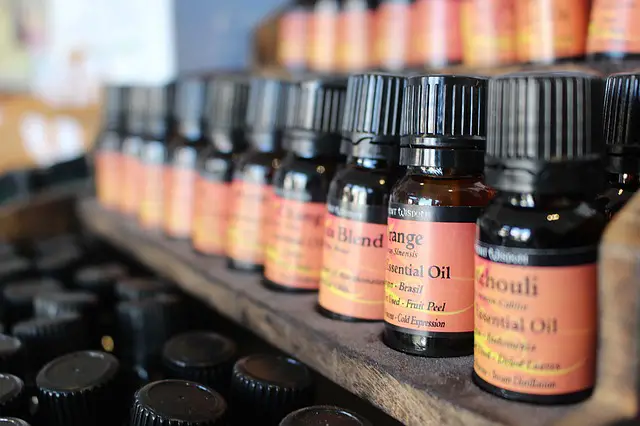
Mix 3-4 drops of the following essential oils in a spray bottle and fill with water.
- Clove Oil
- Rosemary Oil
- Peppermint Oil
- Thyme Oil
Agitate, then spray onto the whole of the plant, leaves, stalk, tip, and don’t forget the underside of the plant as well. This mixture works well on many insect pests, aphids included.
Method #8 Tin Foil

Place kitchen foil directly underneath your vegetable plants as a mulch. Aphids stick to the underside of plants as they can dehydrate in hot sunshine. By using tin foil to reflect the suns rays under your plants you will make the aphids feel very unwelcome.
They should then move on to a different garden and hopefully leave your plants alone. This is not suitable for flower plants but is an effective deterrent for vegetables. The silver foil will also help in the ripening process of tomatoes an extra bonus.
Method #9 Garlic Spray
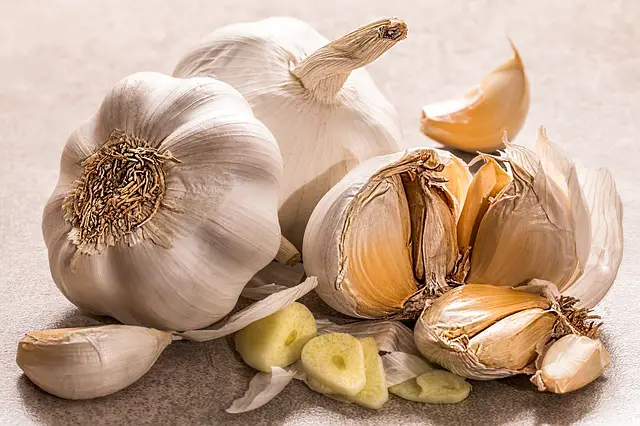
Another effective spray to deter aphids can be made from garlic. Chop 3-4 cloves, steep in water for 7 days, strain into spray bottle and cover your plants with the spray. The strong aroma of the garlic will disguise the host plants from the aphids.
For more information on how members of the allium family are used to repel aphids see my post plants that repel aphids.
Attract Insects That Feed On Aphids
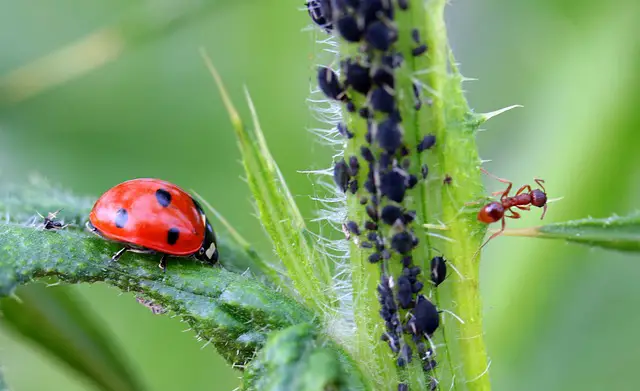
By making your garden as welcoming to beneficial insects as possible, you will find that they will get rid of aphids for you. Insects that feed on aphids include:-
- Lady birds
- Hover flies
- Lace wings
- Parasitic Wasps
- Earwigs
- Beetles
Plants that repel aphids
There are many plants that repel aphids and as many of these as possible should be grown as companion plants to your host plants.
…If this is a topic that interests you, check out my post on plants that repel aphids.
The Best Way To Get Rid Of Aphids
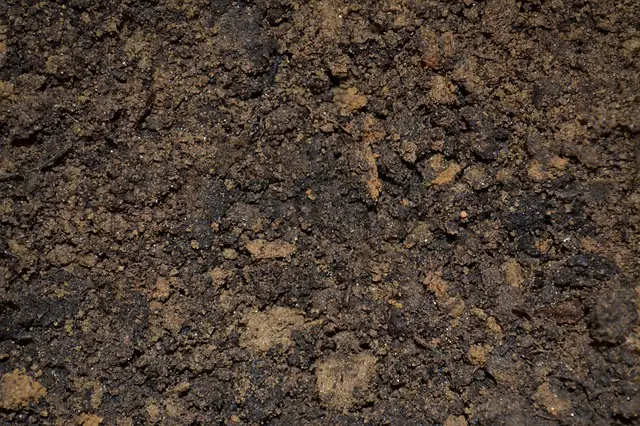
The old maxim, prevention is better than cure, is absolutely the right one here. The fact is healthy plants don’t get aphid infestations. So look at the basics to prevent the problem in the first place.
Improve the condition of the soil, never grow plants in freshly manured or composted ground. In short don’t overly protect (baby) your plants. Look at giving them the optimum conditions for growth.
Not too much sun, not too much shade, adequate water and just enough feed. Keep the soil weed free, mulch well, do all this and you will grow strong, healthy plants. Plants that are well able to with stand a few aphids and other pests.
This is probably the single most important piece of information any gardener can learn. The bottom line is, insects are part of the cycle of life on planet earth. If we kill all the aphids, what will the hover flies (useful pollinators) rear their young on? And so on with birds etc…
Other methods to get rid of Aphids (unnaturally)
As I am an organic grower, this is not my specialist subject and as such, not my favourite subject either. However there are chemical alternatives to use but please remember these are indiscriminate. There’s that word again, it means they will kill all insects and possibly other animals as well.
Fly Paper
This method will not get rid of aphids, but it will give you an indication of how bad the problem is. Not recommended for outdoor use, but useful in the greenhouse just hang a few fly papers around the greenhouse and check to see how many aphids you catch. They consist of a paper coated with a sticky, sometimes sweet substance that attracts flying insects and traps them.
The problem with this type of trap is it is indiscriminate, and beneficial insects will get trapped as well. There is also the potential of getting poisoned when handling fly papers as they are treated with chemical poisons that are harmful to people as well as insects.
Insecticidal Soap
Insecticidal soaps can be obtained from most garden centres and should be applied as per manufacturers instructions. I would urge you to resist these if you can though, as they can harm the good guys too.
These are the two least harmful of the chemical insecticides , and so are the only ones I will include in this post. If you really want to know about harmful insecticides and pesticides then possibly you will already have left this page by now anyway.
What are Aphids?
Aphids are small soft bodied insects that colonise plants and suck sap from the host plant, leaving it open to infection and even death. The first sign of aphids on plants is usually the sticky liquid seen on leaves and stems of plants. This is called honey dew and can cause fungal infections in the host plant.
This honey dew will turn black if it is infected with a fungal disease, another good indicator of infestation. They feed by almost stinging the host plant with their proboscis and literally sucking the life from the plant.
There are many types of aphids including:-
- Black Fly
- Green Fly
- White Woolly Aphid
- Mealy Aphid
- Root Aphid
- White Aphid (white fly)
- Yellow Aphid
- Pink Aphid
They have a life cycle of approximately 40 days and can reproduce at 8 days old. In times when the colony feels threatened they can clone themselves and don’t need to reproduce sexually. Each aphid can produce between 80-90 offspring every week so it’s easy to see how quickly your plants can be over run.
Once the host plant is dying and no longer producing sap, or the aphids have over populated the plant, they will fly to another host plant and start the cycle again. One single aphid can spread an infection from plant to plant.
The life cycle of the aphid colony means they are constantly moving from plant to plant and surprisingly they can vary the type of plant they feed from. Going from stem and leaf to root for feeding and laying eggs to over winter to continue the colony. The eggs hatch in warm temperatures and then the cycle starts again.
Where do Aphids come from?
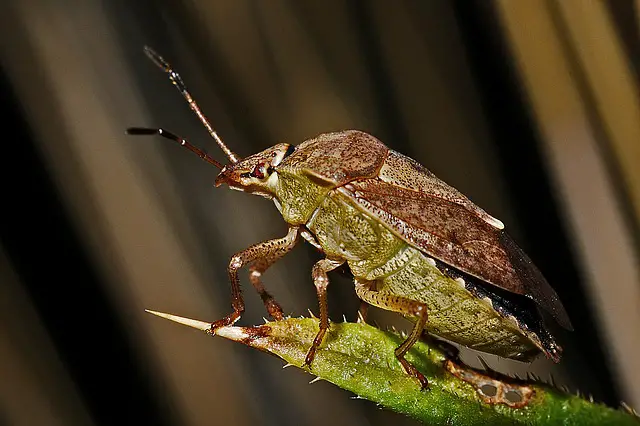
They probably originated in a temperate climate and spread with the winds during warm periods. If you have a favourite plant, there is most certainly a variety of aphid that feeds on it. They have been around since prehistoric times but do not like it too hot so the UK is a perfect breeding ground for aphids.What do Aphids eat?
What Do Aphids Eat?
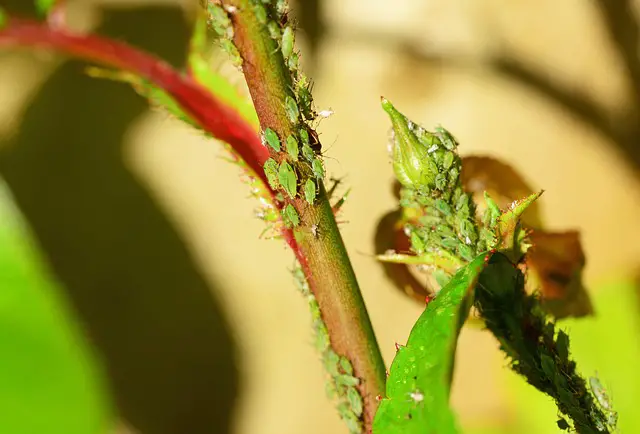
Aphids feed on the sugary sap produced by plants to feed themselves.Because their diet consists of more sugar than protein they have to consume more sugar than they need. That is why they produce the sticky substance known as honey dew.
This leads us very nicely onto our next topic, as you will see ants play an important part in the survival of aphids.
Ants and Aphids
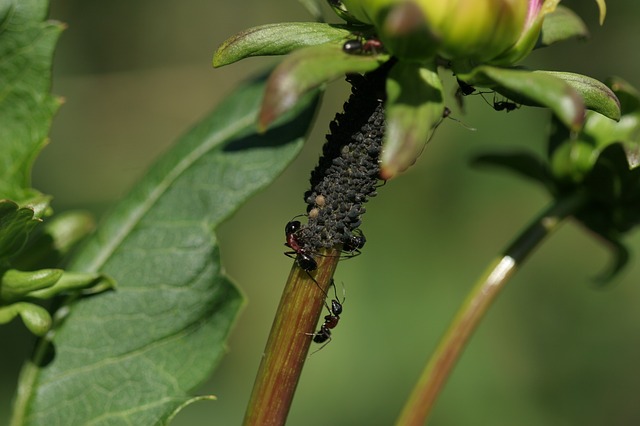
Ants love the sticky food source that is the by product of the aphids diet, the honey dew. They have been observed actually farming the aphids, moving some of the colony to new plants to produce new sources of ant food. Ants will also protect aphids from their predators, fighting the insects to keep them away from their “farm”.
The ants also store aphid eggs in their nests over winter to help preserve the aphid colony and the ants food source. Then once conditions are favourable, the ants will move the aphid eggs onto the correct plant and the cycle starts again. Scientists have even observed ants stroking aphid bodies to get them to secrete the honey dew that the ants feed on.
What eats Aphids?
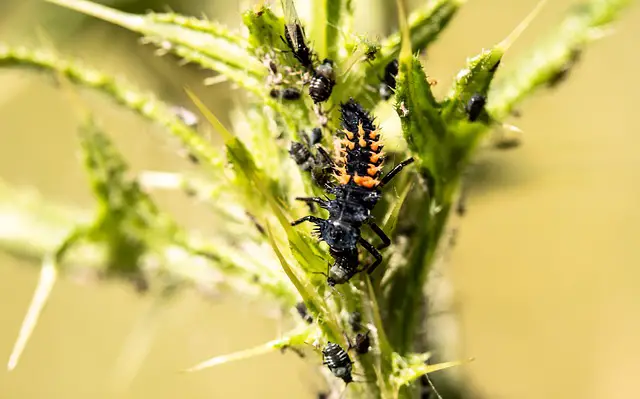
The best answer to this is to refer you back to the sub heading “Attract insects that feed on aphids” above. However a more concise answer can be found courtesy of the Utah state university follow the link for more information.
Do Aphids Bite?
Surprisingly YES some types of aphid are known to bite humans most notably the Pea Aphid. If you are unfortunate enough to pass by a heavily infected pea plant you might get bit. This will be by a special type of aphid scientifically named the soldier aphid.
It’s sole job is to protect the rest of the colony and will attack you as a defence mechanism if you get too close.
The saliva from the aphid contains compounds that can cause irritation and swelling.You are likely to get a red, itchy rash that will usually last for 72 hours. This shouldn’t cause any long term problems and usually clears up on it’s own.
In Summary…
There are many types of aphid and no plant in temperate climates is immune from infestation. The healthier the plant, the less aphids are likely to cause serious problems. Each variety of aphid has a natural predator, and these can be encouraged to your garden by making conditions favourable for them.
This includes growing the right plants to attract them, creating habitats that they will be comfortable in, and leaving certain areas slightly over grown.
Aphids can and do kill plants usually weak plants and young plants, so give your plants a fighting chance by growing them in the right conditions. Soil, lighting, watering etc…
There are many chemicals that will deal with aphids but they will also do away with the beneficial insects too. So stick to natural methods, and grow companion plants that have been PROVEN to repel aphids.
Keep a look out for early warning signs like the sticky honey dew on your plants and act quickly to eliminate any aphids you can spot(obviously the root aphids are impossible to detect until it’s too late).
If you do get bit by soldier aphids it is not serious, just an irritation, literally.

